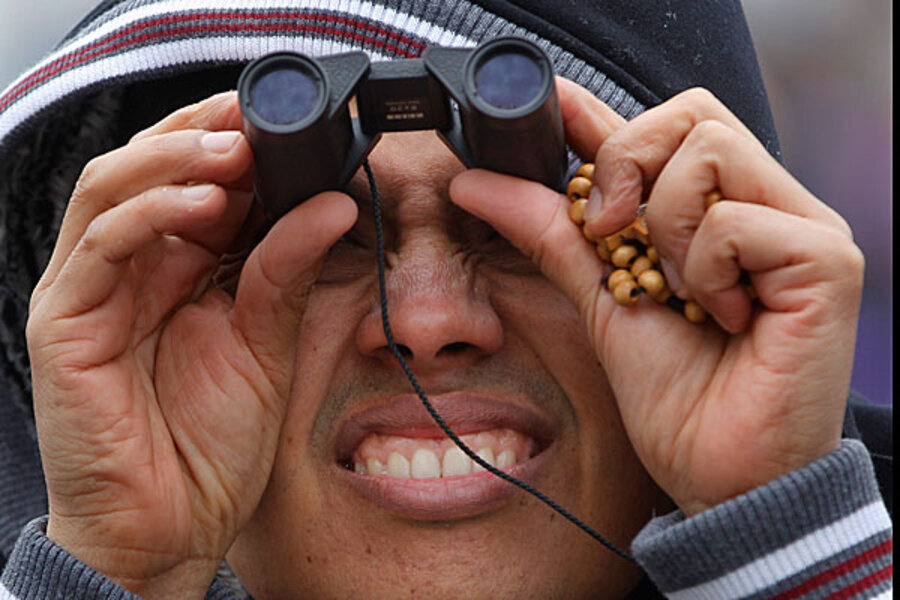After three votes in Rome, no pope chosen yet
Loading...
| Vatican City
Cardinals remained divided over who should be pope on Wednesday after three rounds of voting, an indication of disagreements about the direction of the Catholic church following the upheaval unleashed by Pope Benedict XVI's surprise resignation.
In the second day of the conclave, thick black smoke billowed from the chimney of the Sistine Chapel, prompting sighs of disappointment from the thousands of people gathered in a rain-soaked and chilly St. Peter's Square.
"I'm not happy to see black smoke. We all want white," said the Rev. ThankGod Okoroafor, a Nigerian priest studying theology at Holy Cross University in Rome. "But maybe it means that the cardinals need to take time, not to make a mistake in the choice."
Cardinals voted twice Wednesday morning in the Vatican's famed frescoed Sistine Chapel following an inaugural vote Tuesday to elect a successor to Benedict XVI, who stunned the Catholic world last month by becoming the first pope in 600 years to resign.
The cardinals broke for lunch at the Vatican hotel and planned another two rounds of voting Wednesday afternoon.
The drama — with stage sets by Michelangelo and an outcome that is anyone's guess — is playing out against the backdrop of the church's need both for a manager who can clean up a corrupt Vatican bureaucracy and a pastor who can revive Catholicism in a time of growing secularism.
The difficulty in finding both attributes in one man, some analysts say, means that the world should brace for a long conclave — or at least one longer than the four ballots it took to elect Benedict in 2005.
"We have not had a conclave over five days since 1831," noted the Rev. Thomas Reese, author of "Inside the Vatican," a bible of sorts for understanding the Vatican bureaucracy. "So if they are in there over five days, we know they are in trouble; they are having a hard time forming consensus around a particular person."
The names mentioned most often as "papabile" — a cardinal who has the stuff of a pope — include Cardinal Angelo Scola, the archbishop of Milan, an intellect in the vein of Benedict but with a more outgoing personality, and Cardinal Marc Ouellet, the Canadian head of the Vatican's important bishops' office who is also scholarly but reserved like Benedict.
Brazilian Cardinal Odilo Scherer is liked by the Vatican bureaucracy but not by all of his countrymen. And Cardinal Peter Erdo of Hungary has the backing of European cardinals who have twice elected him as head of the European bishops' conference.
On the more pastoral side is Cardinal Sean O'Malley of Boston, the favorite of the Italian press, and Cardinal Timothy Dolan, the back-slapping, outgoing archbishop of New York who has admitted himself that his Italian is pretty bad — a drawback for a job that is conducted almost exclusively in the language.
Thousands of people braved a chilly rain on Wednesday morning to watch the 6-foot- (2-meter-) high copper chimney on the chapel roof for the smoke signals telling them whether the cardinals had settled on a choice. Nuns recited the rosary, while children splashed in puddles.
After the smoke poured out, the crowds began to dissipate, though a few hangers-on appeared ready to wait out the afternoon balloting.
"The more we wait, the better chance we have of having a surprise," said Ludovic de Vernejouls, a 21-year-old Parisian studying architecture in Rome.
Unlike the confusion that reigned during the 2005 conclave, the smoke this time around has been clearly black — thanks to special smoke flares akin to those used in soccer matches or protests that were lit in the chapel ovens to make the burned ballots black.
The cardinals spent the night sequestered in the Vatican's Santa Marta hotel, an impersonal modern hotel on the edge of the Vatican gardens. They have no access to television, newspapers, cellphones or computers, and the hotel staff has taken an oath of secrecy to not reveal anything they see or hear.
The actual vote takes place in far more evocative surroundings: the Sistine Chapel frescoed by Michelangelo in the 16th century with scenes of "Creation" and "The Last Judgment."
___
Follow Nicole Winfield at www.twitter.com/nwinfield
Copyright 2013 The Associated Press.







